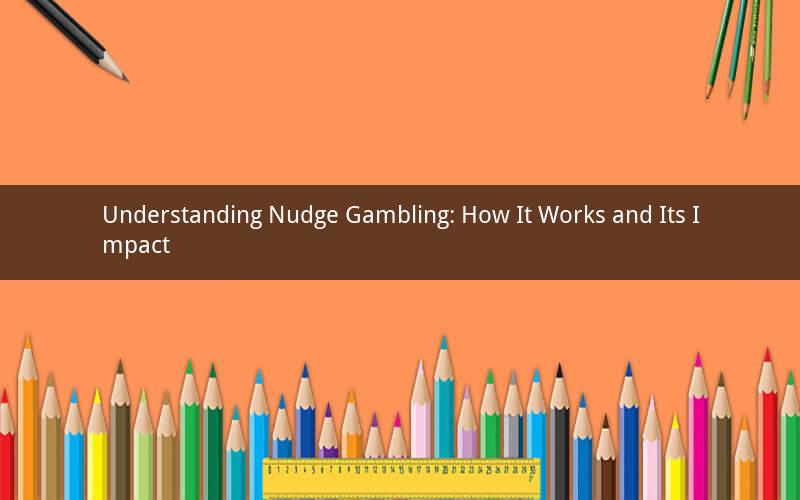
Nudge gambling, a relatively new concept in the world of gambling, refers to the strategic use of subtle psychological techniques to encourage individuals to make certain decisions, often leading to more gambling. This article aims to delve into what nudge gambling is, how it operates, and its potential impact on both individuals and society.
1. What is Nudge Gambling?
Nudge gambling is a concept that draws inspiration from behavioral economics. It involves the application of nudges, which are gentle suggestions or incentives designed to influence the decision-making process of individuals without restricting their freedom of choice. In the context of gambling, nudges are employed to steer players towards certain behaviors, such as playing for longer periods or placing higher stakes.
The idea behind nudge gambling is to create an environment that encourages responsible gambling while still providing players with a thrilling and enjoyable experience. By understanding the psychological triggers that lead to excessive gambling, developers can design games and platforms that minimize the risks associated with problem gambling.
2. How Does Nudge Gambling Work?
Nudge gambling operates through a variety of techniques that are designed to influence players' decisions without being overtly manipulative. Some of the most common nudge strategies include:
a. Gamification: By incorporating elements of game design into gambling platforms, developers can make the experience more engaging and rewarding. This can lead to players spending more time and money on the platform.
b. Loss Aversion: People tend to be more sensitive to losses than gains. Nudge gambling strategies can exploit this psychological bias by encouraging players to take risks in the hope of recouping their losses.
c. Social Proof: The idea that people are influenced by the behavior of others can be used to encourage players to participate in gambling activities. For example, displaying the number of active players or the highest stakes can create a sense of urgency and FOMO (fear of missing out).
d. Progress Tracking: Providing players with feedback on their performance can increase engagement and encourage them to continue playing. This can be achieved through leaderboards, rewards, and other tracking mechanisms.
3. The Impact of Nudge Gambling
While nudge gambling aims to promote responsible gambling, it is important to consider its potential impact on individuals and society. Here are some of the key consequences:
a. Increased Engagement: Nudge strategies can lead to higher levels of engagement among players, which may result in increased revenue for gambling operators.
b. Problem Gambling: The psychological triggers used in nudge gambling can potentially exacerbate problem gambling behaviors. Players may be more susceptible to developing gambling addictions due to the subtle manipulation techniques employed.
c. Social and Economic Impact: Problem gambling can have severe social and economic consequences, including financial hardship, strained relationships, and even mental health issues.
d. Legal and Ethical Concerns: The use of nudge techniques in gambling raises ethical questions regarding the extent to which individuals' freedom of choice should be restricted.
4. Nudge Gambling in Practice
Several gambling operators have already started implementing nudge techniques in their platforms. Here are a few examples:
a. Responsible Gambling Tools: Many online casinos offer features such as deposit limits, self-exclusion, and reality checks to help players maintain control over their gambling activities.
b. Gamification: Slot machines and online games often incorporate gamification elements, such as rewards and leaderboards, to keep players engaged.
c. Social Proof: Online casinos may display the number of active players or the highest stakes to create a sense of urgency and encourage participation.
5. Questions and Answers
Q1: Can nudge gambling be used to prevent problem gambling?
A1: While nudge techniques can be used to promote responsible gambling, they cannot guarantee the prevention of problem gambling. It is essential to combine nudges with other measures, such as education and support services, to address the root causes of problem gambling.
Q2: Is nudge gambling legal in all countries?
A2: The legality of nudge gambling varies by country. It is crucial for gambling operators to comply with the regulations of the jurisdictions in which they operate.
Q3: Can nudge gambling be addictive?
A3: Nudge techniques can potentially exacerbate addictive behaviors, as they may encourage players to take risks and continue gambling despite the potential consequences.
Q4: How can players avoid the negative impact of nudge gambling?
A4: Players can protect themselves from the negative impact of nudge gambling by setting personal limits, being aware of their own risk factors, and seeking help if they suspect they may have a gambling problem.
Q5: What role do regulators play in ensuring the responsible use of nudge techniques in gambling?
A5: Regulators play a crucial role in monitoring and enforcing the responsible use of nudge techniques in gambling. They can establish guidelines and standards to ensure that operators use nudges in a way that promotes responsible gambling and minimizes the risk of harm to players.